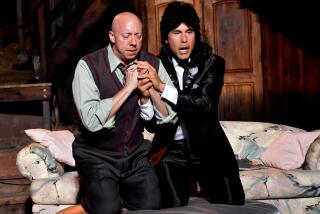Moliere’s Ever-So-Timely Control Freak
- Share via
The world recently became keenly aware that some men still think women should remain cloistered, virtually uneducated and completely submissive.
This is also the opinion of Arnolphe, the wonderful and horrible hub of Moliere’s “The School for Wives,” written in 1662. Arnolphe goes to great lengths to train the perfect wife, using the above guidelines, only to receive one of the most humiliating comeuppances in the history of comedy.
South Coast Repertory’s leaders certainly weren’t thinking of the Taliban when they decided to produce “The School for Wives,” nor is there any evidence onstage that director David Chambers wanted to emphasize that train of thought. He hasn’t reset the play in last year’s Kabul--which might have let the American audience off the hook. If Arnolphe looked like a member of the Taliban, we might not have noticed that he could stand in for anyone, of either gender, who is obsessed with controlling the uncontrollable.
Nonetheless, it’s hard not to think of the Afghan parallel when Arnolphe speaks of the importance of wives keeping their “eyes low,” or when the suitor who wrecks Arnolphe’s plan talks of how love has “begun to lift the veil.”
That parallel is just one more layer on a staging that is already dazzling in two of its central components: a virtuoso performance by Dakin Matthews as Arnolphe and a provocative set designed by Darcy Scanlin, whose work helps usher us into Arnolphe’s mind.
Matthews purrs with smug self-satisfaction at the beginning of the play, as he speaks of his purchase of a poor rural girl at age 4 and his efforts since then to mold her into the docile creature who will do whatever he says after they wed. But now that Agnes (Emily Bergl) is old enough for the nuptials, he’s severely jolted to learn that, in a 10-day period when he was out of town, she has entertained the young swain Horace (Daniel Blinkoff), who has fallen for her.
When Arnolphe first hears the news--from Horace, who thinks of Arnolphe as a trusted friend, not realizing he is Agnes’ possessive guardian--Chambers places Matthews’ Arnolphe with his back to the audience. At first this seems a wasted comic opportunity. In fact, it simply whets our appetite for a series of scenes in which Matthews alternately vents his rage or behaves with false bonhomie when he’s acting as Horace’s confidant.
Matthews uncovers new variations on these emotions with every scene, wielding his cane like a weapon, his reddened face in stark contrast to his snowy white hair, which makes him look about three times as old as Agnes. Despite Arnolphe’s sense of entitlement, he convinces us that he genuinely yearns for Agnes’ heart--we can see the man behind the mask.
Chambers gives him a couple of amusing props that reflect his angst: a folding chair that refuses to stay folded, and a sculptured fountain with a mocking visage.
Audience members on the right side of the hall should take a closer look at Scanlin’s surreal set before the show or at intermission, for they can’t easily see a distorted orange hallway leading to the back of the stage. Adorned with images of Agnes, it becomes an echo chamber when Arnolphe enters, vividly illustrating his obsession.
The orange, the green artificial turf on the floor and the lilac hues of the rest of the set enhance the sense of clashing comic strains. Overhead float lampshades in the form of women’s gowns, suggesting Arnolphe’s attempt to hide the light within the maturing Agnes.
Bergl’s Agnes makes some of that womanly illumination evident from the beginning. With her grave curtseys, she’s hardly a French Gidget. Hal Landon Jr. and Martha McFarland create a lot of fun with the roles of Arnolphe’s dim servants. But Francois Giroday is too earnest as Arnolphe’s wiser friend. The costumes place the action in the 1890s, which neither adds nor subtracts much.
Ranjit Bolt’s translation is brisk and slangy, but occasionally it bends too far out of shape in the pursuit of slightly shocking and not always precise rhymes. And why reduce the number of wives’ maxims that Arnolphe asks Agnes to read aloud from 10 to three?
Generally, however, Chambers’ “School” is richly rewarding and deeply funny.
*
“The School for Wives,” South Coast Repertory, 655 Town Center Drive, Costa Mesa. Tuesdays-Saturdays, 8 p.m.; Saturdays, Sundays, 2:30 p.m.; Sundays, 7:30 p.m. Ends Feb. 10. (714) 708-5555. Running time: 1 hour, 55 minutes.
Dakin Matthews...Arnolphe
Emily Bergl...Agnes
Daniel Blinkoff...Horace
Francois Giroday...Chrysalde
Hal Landon Jr....Alain
Martha McFarland...Georgette
Richard Doyle...Notary/Oronte
Don Took...Enrique
By Moliere. Translated by Ranjit Bolt. Directed by David Chambers. Set by Darcy Scanlin. Costumes by Shigeru Yaji. Lighting by Chris Parry. Sound by B.C. Keller. Stage manager Randall K. Lum.
More to Read
The biggest entertainment stories
Get our big stories about Hollywood, film, television, music, arts, culture and more right in your inbox as soon as they publish.
You may occasionally receive promotional content from the Los Angeles Times.










